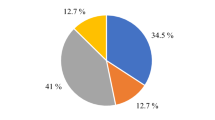Abstract
The adaptive thermal comfort model is a model to predict the temperature at which occupants feel comfortable on the premise of considering their adaptability to the indoor thermal environment in naturally ventilated buildings. In the adaptive thermal comfort model, the mean outdoor temperature is an important and unique parameter for calculating the neutral temperature of occupants in naturally ventilated buildings. In this paper, the determination of two important parameters (time constant and time length) in the adaptive thermal comfort model was the focus of this work. A survey was conducted from April to December in 2016 in six naturally ventilated buildings located in **’an, China. During the survey, the thermal sensation of the subjects was investigated, and the indoor temperature was measured in the meantime. Based on the field data, the best values of time constant and time length were determined through the correlation analysis. This study provides two reliable values to calculate adaptive thermal comfort model based on the running mean temperature for **’an, China.
Access this chapter
Tax calculation will be finalised at checkout
Purchases are for personal use only
Similar content being viewed by others
References
de Dear, R.J., Brager, G.S.: Develo** an Adaptive Model of Thermal Comfort and Preference, pp. 1–312. American Society of Heating, Refrigerating and Air Conditioning Engineers (1997)
ANSI/ASHRAE/IES Standard 55-2013.: Thermal environmental conditions for human occupancy. American Society of Heating, Ventilation, Refrigerating and Air Conditioning Engineers, Atlanta, GA (2013)
CEN/TC, Energy Performance of Buildings.: Part 1: Indoor Environmental Input Parameters for Design and Assessment of Energy Performance of Buildings. Addressing Indoor Air Quality, Thermal Environment, Lighting and Acoustics—Module M1-6 (EN 16798-1). Technical Committee CEN/TC 156, Avenue Marnix 17, B-1000 Brussels (2015)
MOHURD, Evaluation Standard for Indoor Thermal Environment in Civil Buildings (GB/T 50785), Ministry of Housing and Urban-Rural Development (MOHURD). Bei**g, China (2012)
Moujalled, B., Cantin, R., Guarracino, G.: Comparison of thermal comfort algorithms in naturally ventilated office buildings. Energy Build. 40, 2215–2223 (2008)
Yan, H., Mao, Y., Yang, L.: Thermal adaptive models in the residential buildings in different climate zones of Eastern China. Energy Build. 141, 28–38 (2017)
Wang, Z.: A field study of the thermal comfort in residential buildings in Harbin. Build. Environ. 41, 1034–1039 (2006)
Indraganti, M.: Using the adaptive model of thermal comfort for obtaining indoor neutral temperature: Findings from a field study in Hyderabad, India. Build. Environ. 45, 519–536 (2010)
ANSI/ASHRAE, ANSI/ASHRAE Standard 55: Thermal Environmental Conditions for Human Occupancy. American Society of Heating, Refrigerating and Air-Conditioning Engineers (ASHRAE), Atlanta, GA, USA (2017)
Nicol, F., Humphreys, M.: Derivation of the adaptive equations for thermal comfort in free-running buildings in European standard EN15251. Build. Environ 45, 11–17 (2010)
Yang, D., **ong, J.: Adjustments of the adaptive thermal comfort model based on the running mean outdoor temperature for Chinese people: A case study in Changsha China. Build. Environ. 114, 357–365 (2017)
Olesen, B.W., Parsons, K.C.: Introduction to thermal comfort standards and to the proposed new version of EN ISO 7730. Energy Build. 34, 537–548 (2002)
Acknowledgements
This study is supported by “The 13th Five-Year” National Key R&D Program of China (Contract No. 2018YFC0704500), National Natural Science Foundation of China (Grant No. 51838011) and **’an University of Architecture & Technology (Grant No. ZR18054).
Permissions Appropriate permissions from house owners were obtained for study in residential building investigating of indoor thermal comfort.
Author information
Authors and Affiliations
Corresponding author
Editor information
Editors and Affiliations
Rights and permissions
Copyright information
© 2020 Springer Nature Singapore Pte Ltd.
About this paper
Cite this paper
Chai, Q., Yang, L., Li, H., Lv, K. (2020). The Determination of Key Parameters in Adaptive Thermal Comfort Model. In: Wang, Z., Zhu, Y., Wang, F., Wang, P., Shen, C., Liu, J. (eds) Proceedings of the 11th International Symposium on Heating, Ventilation and Air Conditioning (ISHVAC 2019). ISHVAC 2019. Environmental Science and Engineering(). Springer, Singapore. https://doi.org/10.1007/978-981-13-9520-8_103
Download citation
DOI: https://doi.org/10.1007/978-981-13-9520-8_103
Published:
Publisher Name: Springer, Singapore
Print ISBN: 978-981-13-9519-2
Online ISBN: 978-981-13-9520-8
eBook Packages: Earth and Environmental ScienceEarth and Environmental Science (R0)




